|
|
Information
Service of
the Serbian Orthodox Church
April 12,
2005

SERBIAN
ORTHODOX CHURCH DELEGATION IN CHICAGO
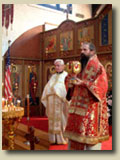 On
the fourth Sunday of the Great Fast, April 10, 2005, which is
dedicated to St. John of the Ladder, abbot in The Sinai, His Grace
Bishop Grigorije of Zahumlje and Herzegovina served Holy Hierarchal
Liturgy in the church of the Resurrection of Christ in Palmer
Square in Chicago, while His Grace Bishop Teodosije of Lipljan
served in the church dedicated to the Holy King Stefan of Decani
on Leland Avenue. On
the fourth Sunday of the Great Fast, April 10, 2005, which is
dedicated to St. John of the Ladder, abbot in The Sinai, His Grace
Bishop Grigorije of Zahumlje and Herzegovina served Holy Hierarchal
Liturgy in the church of the Resurrection of Christ in Palmer
Square in Chicago, while His Grace Bishop Teodosije of Lipljan
served in the church dedicated to the Holy King Stefan of Decani
on Leland Avenue.
After
liturgy in the church of the Holy King Stefan of Decani, Father
Aleksandar Ivanovic welcomed Bishop Teodosije on behalf of his
parishioners, asking for the blessing of the Decani abbot and
the Holy King for his parish and the faithful who dedicated this
church to the Holy King forty years ago. Bishop Teodosije then
delivered a short homily to those present, emphasizing that despite
the difficult position of the Serbian Orthodox Church and its
faithful in Kosovo and Metohija, the monks pray to God and maintain
their holy shrines through great effort and sacrifice, helped
by their sense of the presence of the saints of the Church who
shone in this region in their own time, as well as by well-intentioned
members of the international community, on the other. "Kosovo
is the land of our holy shrines and we must stay and survive there,"
underscored Bishop Teodosije in closing.

SPC
DELEGATION MEETS WITH CONGRESSWOMAN MELISSA BEAN
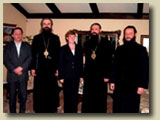 In
the afternoon the Serbian Orthodox Church delegation met with
the local representative in the US Congress, Ms. Melissa Bean
from Illinois. Ms. Bean, who is a member of the Democratic Party,
recently joined the Serbian congressional caucus, and consequently
wanted to learn first hand how she could help. Bishop Grigorije
informed Ms. Bean of the difficult position of the Serbian people
in Kosovo and Metohija, at the same time emphasizing the desire
of the Serbian people to stay and survive in their homes, regardless
of the future political debate on Kosovo. In
the afternoon the Serbian Orthodox Church delegation met with
the local representative in the US Congress, Ms. Melissa Bean
from Illinois. Ms. Bean, who is a member of the Democratic Party,
recently joined the Serbian congressional caucus, and consequently
wanted to learn first hand how she could help. Bishop Grigorije
informed Ms. Bean of the difficult position of the Serbian people
in Kosovo and Metohija, at the same time emphasizing the desire
of the Serbian people to stay and survive in their homes, regardless
of the future political debate on Kosovo.
Bishop
Teodosije then spoke in greater detail about the life of the Serbs
in Kosovo and Metohija. Professor Sijakovic gave a brief overview
of the situation throughout the region, emphasizing that the Serbian
Orthodox Church is the only organization to survive throughout
the territory of the former Yugoslavia, and that it has some 5,000
parishes there. In Croatia the primary problems are the realization
of property rights of the Serbian people as well as the return
of confiscated church lands. In Bosnia and Herzegovina the Church
is extremely concerned by the possibility of annulment of the
Dayton Agreement, which enabled the survival of Republika Srpska
in a still fragile interethnic situation.
On
the territory of Serbia and Montenegro the Church is vitally interested
in the survival of the state union of Serbia and Montenegro, said
Professor Sijakovic, "despite the political pretensions of
some politicians in Montenegro, who have won the support of minority
communities in Montenegro, with whose help they hope to achieve
secession".
"As
far as Kosovo is concerned," stressed Professor Sijakovic,
"the Church is concerned that the secession of the Province
would lead to the disappearance of the Serbian people from this
area as well as to broader regional destabilization. Consequently,
the issue of status should be approached taking into account not
only the interests of the Albanian people but also of the other
peoples in the Balkans, and especially in the Province."
"Regardless of status, the issues of restitution of church
land, the return of the Serbian people to compact settlements
where they would be able to survive, especially near their holy
shrines, the restoration of destroyed churches and monasteries,
the employment of returnees for the restoration of churches and
homes so they can have an income to support themselves, and the
ensuring of mechanism that would protect the Serbian community
in accordance with generally accepted European and global standards
are of exceptional importance to the Church," explained Professor
Sijakovic.
He
emphasized that "for the cultural and spiritual heritage
of the Serbian people in Kosovo and Metohija it is essential to
regulate a special status with strong international guarantees".
Finally, Professor Sijakovic emphasized that "the Serbian
Orthodox Church has an important role in integrational processes
in the Balkans, and loose borders and regional cooperation are
in the best interests of the Serbian people, who live in no less
than five different countries after the collapse of the former
Yugoslavia".
Ms.
Bean thanked the members of the Serbian Orthodox Church delegation
and promised that she would remain engaged and involve the two
senators from the state of Illinois in offering assistance to
the Serbs. She added that it would be extremely helpful if Serbs
in America would organize themselves even more effectively.

GREAT
FAST EVENING SERVICES IN NEW GRACANICA
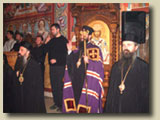 In
the evening the members of the delegation attended the Great Fast
services in the monastery of New Gracanica in the presence of
Bishop Longin, his entire clergy and numerous faithful. The religious
services was officiated by Metropolitan Jovan of Veles and Povardarje,
who is also visiting the USA and testifying to the difficult position
of the Archdiocese of Ochrid and the blatant violation of religious
rights in FYR Macedonia. At the end of the services, the parish
priest of Lesling, Protopresbyter-Stavrophor Milos Vesin, delivered
his homily, followed by a dinner banquet for all present held
in the great hall of the monastery of New Gracanica. In
the evening the members of the delegation attended the Great Fast
services in the monastery of New Gracanica in the presence of
Bishop Longin, his entire clergy and numerous faithful. The religious
services was officiated by Metropolitan Jovan of Veles and Povardarje,
who is also visiting the USA and testifying to the difficult position
of the Archdiocese of Ochrid and the blatant violation of religious
rights in FYR Macedonia. At the end of the services, the parish
priest of Lesling, Protopresbyter-Stavrophor Milos Vesin, delivered
his homily, followed by a dinner banquet for all present held
in the great hall of the monastery of New Gracanica.
During
the dinner Bishop Longin asked Bishop Grigorije to address those
present and provide an overview of the goals of the SPC delegation
in the USA and the results of their visit to date. Bishop Grigorije
accepted the invitation of the host and spoke about the delegation's
meetings with international and US officials, as well as with
religious leaders.
"All
our presentations can be summed up in one sentence: we want to
stay in Kosovo as a Church and as a people regardless of the future(political)
solution. We survived there during the Ottoman empire, we survived
there in the worst and most difficult times, we survived there
with great sacrifice, with God's help and with great wisdom. That
is why we should survive there now," said Bishop Grigorije
before the clergy and the faithful.
The
Bishop emphasized that US officials have shown a high degree of
understanding and respect toward Patriarch Pavle and the Serbian
Orthodox Church, emphasizing the alliance between Serbia and the
US in both World Wars, and the constructive position of the Serbian
Orthodox Church which strongly supported demonstrations against
the former regime, and played an active role in the triumph of
democratic forces in Serbia.
Bishop
Grigorije explained to those present that the SPC should not allow
others to talk about it, usually with ill intent, but must itself
clearly articulate its views and intensify contacts at the international
level. "The Holy Synod of Bishops and our holy bishops sent
us, as younger bishops, to struggle (toward this end) to the best
of our ability. This delegation came to the US, another will go
to Brussels, a third to Moscow, then to Berlin, London, Rome,
Athens, to every part of the world," said Bishop Grigorije,
whose comments were met at the end of his remarks by hearty applause
on the part of those present.
On
Monday, April 11, 2005, the Serbian Orthodox Church delegation
will visit the parish of the Holy Archangel Michael in Lesling.
They are also scheduled to meet with congressman Rahm Emanuel,
the vice chairman of the Serbian caucus in the US Congress.

DEATH
OF ARCHBISHOP IAKOVOS, FORMER ARCHBISHOP OF THE GREEK ORTHODOX
ARCHDIOCESE OF NORTH AND SOUTH AMERICA
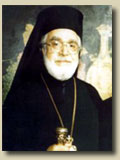 Archbishop
Iakovos, 93, spiritual leader of Greek Orthodox Christians in
the Western Hemisphere from 1959 to 1996, passed away April 10,
in Stamford Hospital, Stamford, Connecticut, U.S.A., from a pulmonary
ailment. Archbishop
Iakovos, 93, spiritual leader of Greek Orthodox Christians in
the Western Hemisphere from 1959 to 1996, passed away April 10,
in Stamford Hospital, Stamford, Connecticut, U.S.A., from a pulmonary
ailment.
Born
on the Island of Imvros, Turkey on July 29, 1911 to Maria and
Athanasios Coucouzis, he was christened Demetrios at birth. He
enrolled at age 15 in the Ecumenical Patriarchal Theological School
at Halki. After graduating with high honors, Demetrios Coucouzis
was ordained Deacon in 1934, taking the ecclesiastical name Iakovos.
Five years after his ordination, Deacon Iakovos received an invitation
to serve as Archdeacon to the late Archbishop Athenagoras, the
Primate of North and South America, who later became Ecumenical
Patriarch.
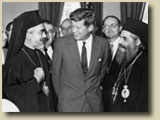 Ordained
to the priesthood in 1940 in Lowell, MA, he served at St. George
Church, Hartford, Connecticut, while teaching and serving as assistant
dean of the Holy Cross Greek Orthodox Theological School. In 1941,
he was named Preacher at Holy Trinity Cathedral in New York City
and appointed Dean of the Annunciation Greek Orthodox Cathedral
in Boston in 1942, where he remained until 1954. In 1945 he earned
a Master of Sacred Theology Degree from Harvard University. Ordained
to the priesthood in 1940 in Lowell, MA, he served at St. George
Church, Hartford, Connecticut, while teaching and serving as assistant
dean of the Holy Cross Greek Orthodox Theological School. In 1941,
he was named Preacher at Holy Trinity Cathedral in New York City
and appointed Dean of the Annunciation Greek Orthodox Cathedral
in Boston in 1942, where he remained until 1954. In 1945 he earned
a Master of Sacred Theology Degree from Harvard University.
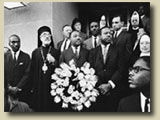 In
1954, he was ordained Bishop of Melita, by his spiritual father
and mentor, Ecumenical Patriarch Athenagoras. He was enthroned
as Primate of the Greek Orthodox Church in the Americas on April
1, 1959 at Holy Trinity Cathedral. He retired at the age of 85
on July 29,1996, after 37 years of service which were distinguished
by his leadership in revitalizing Christian worship and championing
human and civil rights. He had the courage to walk hand in hand
with Dr. Martin Luther King, Jr. in protests in March 1965. He
was the recipient of the U.S. Presidential Medal of Freedom bestowed
by U.S. President Jimmy Carter on June 9, 1980. A dynamic participant
in the contemporary ecumenical movement for Christian unity, he
served for nine years as president of the World Council of Churches. In
1954, he was ordained Bishop of Melita, by his spiritual father
and mentor, Ecumenical Patriarch Athenagoras. He was enthroned
as Primate of the Greek Orthodox Church in the Americas on April
1, 1959 at Holy Trinity Cathedral. He retired at the age of 85
on July 29,1996, after 37 years of service which were distinguished
by his leadership in revitalizing Christian worship and championing
human and civil rights. He had the courage to walk hand in hand
with Dr. Martin Luther King, Jr. in protests in March 1965. He
was the recipient of the U.S. Presidential Medal of Freedom bestowed
by U.S. President Jimmy Carter on June 9, 1980. A dynamic participant
in the contemporary ecumenical movement for Christian unity, he
served for nine years as president of the World Council of Churches.
Immediately
following the passing of Archbishop Iakovos, His Eminence Archbishop
Demetrios, Primate of the Greek Orthodox Church in America, said:
“I
have had the great honor and joy to know Archbishop Iakovos for
more than fifty years. He has been a superb Archbishop who offered
to the Church an intense, continuous, multifaceted and creative
pastoral activity. He has been a true and whole shepherd to his
people trying day and night to teach them, to guide them, to comfort
them, to encourage them, to edify them in Christ and to lead them
as a loving shepherd to the ‘springs of the living waters’ (Rev.
7:17) of faith and life with God.”

FILM
ABOUT THE SUFFERING OF THE SERBS
– SLAUGHTER, CONVERT, EXPEL
In the Yugoslav
Film Museum, Kosovska 11, on Wednesday, April 20, 2005, at 9:00
a.m. the premiere of a documentary film entitled “Pobij, pokrsti,
proteraj” (Slaughter, convert, expel) will be held. The film talks
about the suffering of the Serbs in Muslim and Croat war camps
in Bosnia and Herzegovina 1992-96. The author and coproducer is
Svetlana Petrusic, journalist and publicist. The producer is Ivica
Vidanovic.
“Slaughter,
convert, expel” is a political documentary film whose basic theme
is the torture of war camp inmates on the territory of Bosnia
and Herzegovina in the period of the civil war from 1992. The
main story unfolds in the municipality of Odzak in Bosnia and
Herzegovina.

[Serbian
Translation Services]
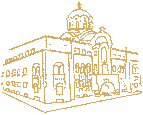
Copyright © 1999-2004 by
The Information Service of the Serbian Orthodox Church
11000 Belgrade
Kralja Petra I no.5
+381 11 3282 596
e-mail
|

